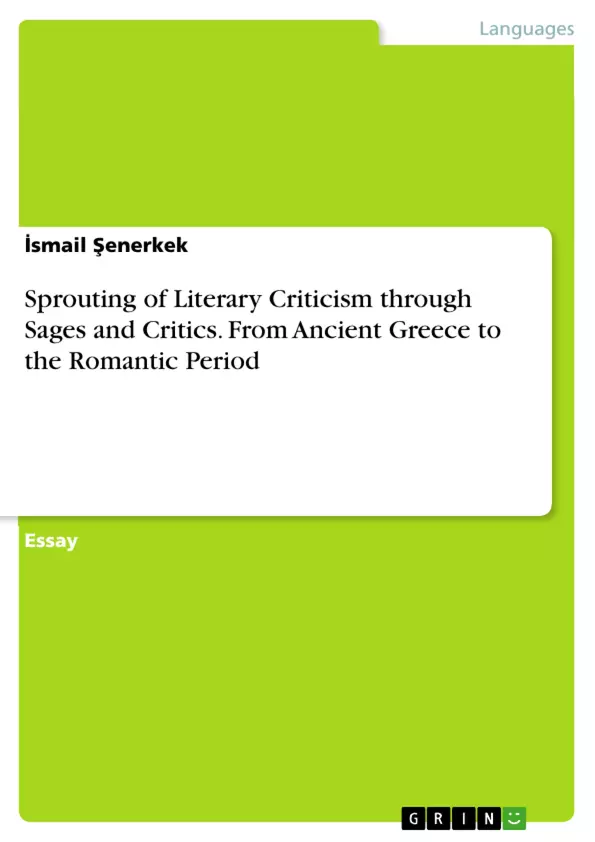In this paper, the development of literary criticism from Ancient Greece to the British Period will be examined. The periods will be considered in light of the perspectives and works of major philosophers and critics towards literary criticism. Literary criticism is a disciplined activity that attempts to describe, study, analyse, justify, interpret, and evaluate a work of art. It is argued that formal literary criticism has begun after the evaluation of Aristophanes' play "The Frogs" in Ancient Greece in the 400s BC.
This situation is not accidental, because the Greeks of the period are a nation that is hand in glove with the philosophy that puts thinking at the centre. The concept of thinking in Ancient Greece does not lose its vitality in any artistic activity, neither written nor visual, due to their curiosity and desire for knowledge. As a result, it is inevitable that world-famous philosophers such as Plato and Aristotle are growing up in Ancient Greece.
Literary criticism has taken its place in the literature of almost all nations for centuries since the 5th century BC and still, it continues to develop. This criticism culture ongoing from the past has been one of the main factors in the shaping of English Literature to this day.
Inhaltsverzeichnis (Table of Contents)
- The Sprouting of Literary Criticism through Sages and Critics: From Ancient Greeks to Romantic Period
- Ancient Greek Criticism
- Plato
- Aristotle
- Greek and Latin Criticism
- Horace
- Longinus
- Plotinus
- Late Middle Ages and Medieval Humanism
- Dante Alighieri
- Giovanni Boccaccio
- Early Modern Literary Criticism
- Sir Philip Sidney
- Neoclassical Literary Criticism
Zielsetzung und Themenschwerpunkte (Objectives and Key Themes)
This article aims to trace the evolution of literary criticism, focusing on key figures and their contributions from Ancient Greece to the British Romantic Period. The analysis examines the development of critical thought through the lens of philosophical perspectives and influential literary works.
- The concept of imitation (mimesis) in literature and its evolution from Plato to Aristotle and beyond.
- The role of poetry in society, its didactic purpose, and the debates surrounding its value.
- The importance of language in literature, including the shift towards vernacular languages.
- The influence of classical models and values on literary criticism.
- The development of different critical perspectives and their impact on the understanding of literature.
Zusammenfassung der Kapitel (Chapter Summaries)
The article begins by exploring the roots of literary criticism in Ancient Greece, specifically focusing on the influential contributions of Plato and Aristotle. Plato's concept of "imitation of the imitation" and his critique of poetry as an obstacle to truth are discussed, alongside his belief that poetry should serve a didactic purpose. Aristotle, however, presents a more nuanced view of imitation, arguing that it is essential to human nature and plays a valuable role in artistic expression. He emphasizes the importance of analyzing the elements that constitute a work rather than focusing solely on its overall meaning.
The article then examines the development of literary criticism in the Roman Empire, highlighting the contributions of Horace, Longinus, and Plotinus. Horace emphasizes the importance of tradition and the need for poetry to be both "sweet and useful," emphasizing its role in providing pleasure and instruction. Longinus, known for his concept of the sublime, introduces the idea of analyzing individual elements within a text and highlights the emotional aspects of literature.
The article continues to explore the transition of literary criticism from the Roman Empire to the Late Middle Ages and Medieval Humanism, focusing on the Italian figures of Dante Alighieri and Giovanni Boccaccio. Dante advocates for the use of vernacular language in literature, arguing that it should be accessible to everyone. He also emphasizes the importance of allegorical elements in literature, as exemplified in his masterpiece, The Divine Comedy. Boccaccio, on the other hand, shifts the focus away from religious themes and towards human events, as seen in his work Decameron.
The article concludes its examination of the development of literary criticism with a brief look at Sir Philip Sidney's contribution to Early Modern literary criticism. Sidney's work, Apology for Poetry, defends poetry against its detractors and highlights its value as a genre that can both instruct and delight.
Schlüsselwörter (Keywords)
Key terms and concepts explored in this article include literary criticism, imitation, mimesis, didacticism, poetry, vernacular, allegory, sublime, neoclassicism, and the influence of Greek and Roman literary traditions on the development of Western literary criticism.
When did formal literary criticism begin?
Formal literary criticism is often traced back to Ancient Greece around 400 BC, specifically with the evaluation of Aristophanes' play "The Frogs."
What was Plato's view on poetry?
Plato viewed poetry as an "imitation of an imitation" and was critical of it, believing it could lead people away from the truth and should only serve didactic purposes.
How did Aristotle's concept of mimesis differ from Plato's?
Aristotle saw imitation (mimesis) as a natural human instinct and a valuable way of learning and expressing artistic truth, rather than a mere deception.
What is the "Sublime" in literary criticism?
Introduced by Longinus, the Sublime refers to a quality of greatness or emotional intensity in literature that elevates the reader's soul.
Why did Dante Alighieri advocate for the vernacular?
Dante believed that literature should be accessible to a wider audience, not just those who knew Latin, which was a revolutionary idea in the Late Middle Ages.



